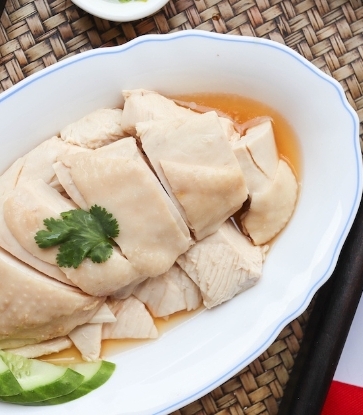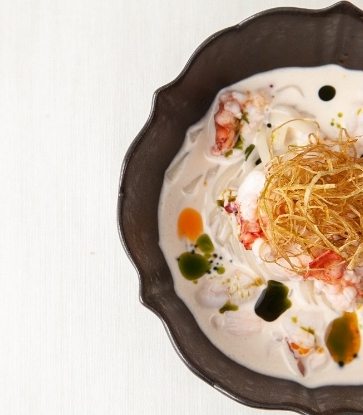Sustainability has become a focus in the culinary industry in recent years. With mounting environmental woes — accelerated global warming, rising sea levels and climate change, the world is facing an alarming spike in the emission of greenhouse gases. According to the World Meteorological Organization, the level of heat-trapping greenhouse gases in the atmosphere have reached a record high in a report published last November. The organisation's Greenhouse Gas Bulletin showed increased levels of greenhouse gases such as carbon dioxide, methane and nitrous oxide. Global food production typically produces these greenhouse gases from agricultural practices such as the cultivation of livestock and mass crop production.
In recent years, sustainability has gained considerable clout among chefs around the world. More chefs are incorporating sustainable produce and cooking methods into their cuisine and going in-depth in understanding the provenance. Here are 10 tips that foodies can get started on eating sustainably.

1. Consult The MICHELIN Nordic Guide Sustainability Award
The MICHELIN Guide Nordic Countries 2019 Selection saw an inclusion of a Sustainability Award this year. The award recognises restaurants with impressive eco credentials and social media engagement promoting better food and sustainable land use practices. This year’s recipient is one-MICHELIN-starred Credo in Trondheim in Norway that is helmed by chef Heidi Bjerkan.
Her restaurant, which is housed in a former milk tank factory, epitomises sustainable redevelopment. The restaurant is attached to a biodynamic farm and Bjerkan works closely with farmers. In fact, some of them work as hosts in her restaurant to regale diners with stories behind the produce.
The Sustainability Award is in alignment with one of the Michelin Group’s key commitments: Sustainable Mobility. The company envisions a circular economy to preserve the planet's resources by reducing, reusing, renewing and recycling the materials needed to produce the Company's products and services, to avoid leaving a lasting environmental impact. One of the Michelin Group's visions for the next 30 years is for its tires to incorporate up to 80% sustainable materials and for 100% of end-of-life tires to be recycled or reused as fuel.
2. Cut down on meat
Greenhouse gases are a major cause of climate change. About a quarter of greenhouse gas emissions in the world stem from food production. Of these emissions, most of them are from animal products. Which meat to cut down on? Beef and lamb, which emit half of the greenhouse gases farmed animals produce in the world. These greenhouse gases include carbon dioxide and methane. A cow produces 70 to 120kg of methane in a year.
RELATED: 5 Questions With Norway’s Chef Heidi Bjerkan Of Credo On Cooking Sustainably

3. Follow chefs who practise sustainable dining
One of the biggest advocates of sustainable dining is Eneko Atxa of three-MICHELIN-starred Azurmendi in the Basque Country. The Spanish chef lives and breathes the concept of sustainability from his cuisine to the way he operates his restaurant. In 2010, Eneko constructed a technologically-advanced restaurant building that boasts sustainable features. Rainwater is used in the garden, greenhouses and toilets, the glasshouse building uses sunlight to maximum effect, temperature and ventilation is controlled, which reduces the need for air-conditioning, and photovoltaic solar panels on glass roofs are a source of renewable energy. Diners can also charge their cars at the restaurant’s electrical outlets in the carpark.
Other chefs from MICHELIN-starred restaurants that have been championing sustainability include Alain Passard of three-MICHELIN-starred Arpège in France, who is hailed as a pioneer in plant-based cuisine and employs sustainable kitchen practices, such as using vegetables grown in biodynamic farms. Three-MICHELIN-starred Schloss Schauenstein sources most of its produce within its sprawling castle grounds that include orchards and woodlands and from organic farms near the restaurant. Chef-owner Andreas Caminada also powers the restaurant and its hotel rooms with renewable hydroelectricity and ensures that local produce are packed in reusable packaging such as baskets and glass.
4. Prioritise plant-based diets
READ ALSO: Are Plant-Based Meat Substitutes The Way To Go In The Dining World?

5. Choose sustainable seafood
According to a report by the United Nations Food and Agriculture Organisation last year, fish consumption is at a record high rate with over-fishing occurring in one-third of the world's oceans. The report states that fish consumption is at an all-time high of 20.2kg per person, up from 9kg in 1961. Unsustainable seafood refers to seafood species that are considered to be overexploited, overfished and sourced from poorly managed fisheries and farm operations. These species include bluefin tuna, yellow croaker and coral trout. When shopping for seafood, look out for logos by the seafood sustainability certification organisations such as The Marine Stewardship Council (MSC) and the Aquaculture Stewardship Council (ASC).
MICHELIN-listed integrated resort Marina Bay Sands in Singapore, which houses two-MICHELIN-starred Waku Ghin and one-MICHELIN-starred CUT By Wolfgang Puck, uses more than 90 types of seafood from seafood sources that are approved by the MSC and ASC. In Paris, one MICHELIN-starred Auguste is known for championing sustainable fishing and consumption of seafood products. Its chef Gaël Orieux has also come up with a list of sustainable seafood that chefs can refer to.
READ ALSO: 5 Sustainable Food Practices By MICHELIN-Listed Hotels & Restaurants In Singapore
6. Say no to straws
The next time you quench your thirst, remember to ditch the plastic straw and opt for a reusable one that is made with stainless steel, bamboo or silicone. According to the National Geographic, it is estimated that 500 million straws are used every day, and as many as 8.3 billion straws flow into the ocean and pollute beaches around the world.
Diners can do their part by requesting for less plastic takeaway materials, such as containers and utensils. Disposable items such as drink stirrers, cup lids and toothpicks can also be eliminated.

7. Recycle food waste
According to the United Nationals Food and Agricultural Organisation, an estimated one-third of all food produced around the world is either lost or goes to waste. An environment-friendly way to grapple with food waste is ensuring that food such as bread, soya bean and grains go through an anaerobic digestion process and gets converted into compost or fertilisers for landscaping purposes, and non-potable water for general washing and cleaning. MICHELIN-listed hotel Grand Hyatt Singapore, which runs buffet restaurant Mezza9, recycles food waste such as vegetable, poultry, bones, egg shell, tissue paper and fruit peel from its in-house restaurants and kitchens. The food waste is converted to organic fertiliser, which is used for landscaping purposes.
8. Cut down on plastics
Plastic makes up to 80% of marine litter, which is concentrated in coastal areas and reef environments. According to figures from the United Nations, more than 11.1 billion items of plastic are thought to be in the Asia-Pacific region alone and this is expected to increase to 15.7 billion by 2025. The average time a person uses a plastic bag is just 12 minutes before it is discarded, but the material takes more than 500 years to degrade in landfills.
In one-MICHELIN-starred restaurant Credo in Norway, plastic packaging such as bags and cling wrap are not used in the kitchen, while chef Richard Ekkebus of the revamped two-MICHELIN-starred Amber in Hong Kong has decided to minimise the use of plastic squeeze bottles.

9. Go organic
Organic farming methods have a less detrimental impact on the environment. For organic-certified farms that are approved by the United States Department of Agriculture, the produce has to be cultivated using natural pest-control methods such as eggshells and crop rotation, and synthetic fertilisers and genetically modified organisms and products cannot be used. According to a study funded by the British Department for Environment, Food and Rural Affairs, growing organic crops uses 35% less energy per unit of production, while organic dairy farm production consumes 74% less energy than regular ones.
10. Eat mindfully
One of the more direct ways of eating sustainably is to practice mindful eating. Focusing on what you’re eating allows you to reflect on where your food came from and its health benefits. By paying closer attention to your hunger signals, you may learn that you don’t need as much food as you thought, and resize your meals accordingly. By paying more attention to how we eat, we can alter our food consumption and reduce food waste, as well as become motivated to learn about sustainable food sources.























